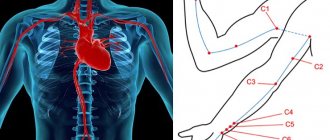“All diseases come from nerves” - have you ever heard such a phrase?
In fact, such folk wisdom is a simplified version of the idea about the existence of psychosomatic diseases, that is, diseases whose development was provoked by the influence of negative mental or psychological factors, in particular, traumatic situations. The very concept of psychosomatics, which covers the relationship between the mental sphere and physical health, is broader than the concept of psychosomatic diseases. Psychosomatics includes the influence of somatic pathology on the psyche. These are mental somatogenic disorders, the patient’s reaction to the disease, types of the patient’s attitude towards the disease, etc. On the other hand, psychosomatics studies the influence of mental factors on the manifestations and course of somatic illness. And finally, psychosomatics include psychosomatic diseases themselves, that is, somatic diseases caused by mental factors (mental conflicts, traumatic situations, etc.).
Nowadays, no one denies the most important role of a person’s psychological state in the formation of the disease and in the treatment process. A certain emotional background can either lead to a speedy recovery or worsen the state of health. But there are diseases when mental factors not only influence the characteristics of the course of the disease, but can also become their cause - these are psychosomatic diseases such as hypertension, coronary heart disease (CHD), neurodermatitis, ulcerative colitis (UC), gastric ulcer and 12 duodenum. One way or another, it is impossible to deny the crucial role of psychotraumatic factors in the emergence and development of psychosomatic diseases, including the occurrence of hypertension.
Psychosomatics of hypertension
Hypertension (hypertension) is usually classified as a psychosomatic disease when mental factors (various traumatic situations, negative psychological states, frustrations, etc.) lead to their occurrence. After all, this often happens: you worry too much - and your blood pressure increases. Then the situation improves and the pressure returns to normal. But what if a person lives in a state of chronic stress or constant psychologically traumatic situations, if the body’s “defense forces” fail? This situation can become “fertile” soil for the emergence of hypertension.
In hypertension, there is increased pressure in the blood vessels with increased tone of their walls (first, the tone of the vascular walls increases, as a result of which the vessels narrow and the pressure increases). In this process, a person’s negative emotions and activation of the autonomic nervous system can play a rather important role. The autonomic nervous system is closely connected with both our emotions and vascular tone, which means that, regardless of our conscious control, emotions can influence the functioning of the body.
How does the influence of mental factors and negative emotions manifest themselves in the case of hypertension? Everything can start with the so-called. “resistance”: the body begins to “resist” external negative influences (physical or psychological), the heartbeat quickens and blood flow increases, muscles tense - this is how the body tries to satisfy the body’s needs for oxygen, to prepare a person to fight the source of “pressure”. Over time, the source of the negative impact (pressure) disappears, and the body relaxes, the heartbeat slows down and the pressure normalizes. At least that's how it should happen. In fact, constant psychotraumatic factors, which are accompanied by a bouquet of negative emotions, can disrupt the normal functioning of blood vessels: they do not have time to return to normal immediately after stressful situations and therefore blood pressure remains elevated. This is how it turns out that regular bursts of negative experiences can affect the appearance and development of hypertension.
Hypertonic disease
Treatment of hypertension (illustration)
Ekaterina V. (38 years old) has been forced to constantly take antihypertensive drugs due to high blood pressure over the past 3 years. She underwent a special examination, as a result of which she was diagnosed with hypertension. She herself understands that the disease developed on a nervous basis - due to excessive psychological stress at work. Ekaterina is the director of a successful private company. Work is actually not time-regulated, so production issues have to be resolved not only in the office, but also at home. Lives with his elderly father in a three-room apartment. Her sex life is limited to infrequent intercourse with an elderly married man whom she has known for more than 10 years. The love that once brought them together has long passed, but the sexual partnership continues to be stereotypically pleasant.
This story has a happy ending. As a result of the treatment, the patient managed, firstly, to master the role of an adult woman; secondly, find a lover among your colleagues and marry him; thirdly, to conceive and give birth to a child, and shift the role of director to her husband. The remarkable thing is that the increase in hypertension during pregnancy predicted by the gynecologist not only did not happen, but on the contrary, blood pressure returned to normal.
Causes of the disease
It can be assumed that the peculiarities of a person’s worldview and the way he reacts to various events are, to some extent, the root of the emergence of psychosomatic diseases. In the case of hypertension, the problem with high blood pressure can also characterize a similar reaction and worldview of such a patient. People who have difficulty accepting a situation that they do not like or that does not correspond to their plans may suffer from hypertension. In most cases, those suffering from hypertension may have internal tension against the background of traumatic situations for long periods of time due to various fears and concerns, or due to constant resistance to someone or something. If such “resistance” is present, it is as if a person is swimming against the current, exhausting his own body in the fight against the elements.
Another common feature for patients with psychosomatic diseases, including hypertension, can be negative emotions, which become the cause or accompanying factor of the disease. Some of the negative experiences that lead to the problem of high blood pressure include:
- Fear, constant anxiety.
- Increased irritability, short temper. Such a person tends to react very “sharply” to various events that are not beneficial to him or that upset his plans, to various irritants, life’s troubles, etc.
- Pessimism, dysthymia, so-called. "minor" mood. Any life events are assessed as if through gray glasses: the main attention is paid only to the negative aspects.
- Anger, shame, lack of autosympathy. A person experiences pronounced negative emotions towards himself - angry at himself, ashamed of himself, etc.
- Negativity towards others and towards oneself. In this case, “everything is not right” for the person: the world around him is “not like that,” and his loved ones are “not like that,” and the person himself is not to his liking.
- Perfectionism, when a person constantly tries to achieve the ideal, and an imperfect result of work has no right to exist. In many cases, such people are ready to “pull the sinews” from themselves and those around them, just to get closer to an ephemeral ideal that is never destined to be achieved.
- The desire for complete and constant control over the situation and a feeling of dissatisfaction in situations of loss of control, etc.
All these conditions can be both a co-causal factor in the onset of hypertension and an accompanying factor that worsens the course of the disease. After some time, the question of the root cause of the problems, whether hypertension arose first or whether the cause of its manifestation was psychological factors or traumatic situations, is relegated to the background. A series of recurring somatic symptoms and negative emotions forms a vicious circle, where one influences the other. Is there a way out of this vicious circle?
Psychosomatics of diseases: hypertension
“All diseases come from nerves” - have you ever heard such a phrase? In fact, such folk wisdom is a simplified version of the idea about the existence of psychosomatic diseases, that is, diseases whose development was provoked by the influence of negative mental or psychological factors, in particular, traumatic situations.
The very concept of psychosomatics, which covers the relationship between the mental sphere and physical health, is broader than the concept of psychosomatic diseases. Psychosomatics includes the influence of somatic pathology on the psyche. These are mental somatogenic disorders, the patient’s reaction to the disease, types of the patient’s attitude towards the disease, etc. On the other hand, psychosomatics studies the influence of mental factors on the manifestations and course of somatic illness. And finally, psychosomatics include psychosomatic diseases themselves, that is, somatic diseases caused by mental factors (mental conflicts, traumatic situations, etc.).
Nowadays, no one denies the most important role of a person’s psychological state in the formation of the disease and in the treatment process. A certain emotional background can either lead to a speedy recovery or worsen the state of health. But there are diseases when mental factors not only influence the characteristics of the course of the disease, but can also become their cause - these are psychosomatic diseases such as hypertension, coronary heart disease (CHD), neurodermatitis, ulcerative colitis (UC), gastric ulcer and 12 duodenum. One way or another, it is impossible to deny the crucial role of psychotraumatic factors in the emergence and development of psychosomatic diseases, including the occurrence of hypertension.
Psychosomatics of hypertension
Hypertension (hypertension) is usually classified as a psychosomatic disease when mental factors (various traumatic situations, negative psychological states, frustrations, etc.) lead to their occurrence. After all, this often happens: you worry too much - and your blood pressure increases. Then the situation improves and the pressure returns to normal. But what if a person lives in a state of chronic stress or constant psychologically traumatic situations, if the body’s “defense forces” fail? This situation can become “fertile” soil for the emergence of hypertension.
With hypertension, increased pressure in the blood vessels with increased tone of their walls (initially, the tone of the vascular walls increases, as a result of which the vessels narrow and the pressure increases). In this process, a person’s negative emotions and activation of the autonomic nervous system can play a rather important role. The autonomic nervous system is closely connected with both our emotions and vascular tone, which means that, regardless of our conscious control, emotions can influence the functioning of the body.
How does the influence of mental factors and negative emotions manifest themselves in the case of hypertension? Everything can start with the so-called. “resistance”: the body begins to “resist” external negative influences (physical or psychological), the heartbeat quickens and blood flow increases, muscles tense - this is how the body tries to satisfy the body’s needs for oxygen, to prepare a person to fight the source of “pressure”. Over time, the source of the negative impact (pressure) disappears, and the body relaxes, the heartbeat slows down and the pressure normalizes. At least that's how it should happen. In fact, constant psychotraumatic factors, which are accompanied by a bouquet of negative emotions, can disrupt the normal functioning of blood vessels: they do not have time to return to normal immediately after stressful situations and therefore blood pressure remains elevated. This is how it turns out that regular bursts of negative experiences can affect the appearance and development of hypertension.
Causes of the disease
It can be assumed that the peculiarities of a person’s worldview and the way he reacts to various events are, to some extent, the root of the emergence of psychosomatic diseases. In the case of hypertension, the problem with high blood pressure can also characterize a similar reaction and worldview of such a patient. People who have difficulty accepting a situation that they do not like or that does not correspond to their plans may suffer from hypertension. In most cases, those suffering from hypertension may have internal tension against the background of traumatic situations for long periods of time due to various fears and concerns, or due to constant resistance to someone or something. If such “resistance” is present, it is as if a person is swimming against the current, exhausting his own body in the fight against the elements.
Another common feature for patients with psychosomatic diseases, including hypertension, can be negative emotions, which become the cause or accompanying factor of the disease. Some of the negative experiences that lead to the problem of high blood pressure include:
- Fear, constant anxiety.
- Increased irritability, short temper. Such a person tends to react very “sharply” to various events that are not beneficial to him or that upset his plans, to various irritants, life’s troubles, etc.
- Pessimism, dysthymia, so-called. "minor" mood. Any life events are assessed as if through gray glasses: the main attention is paid only to the negative aspects.
- Anger, shame, lack of autosympathy. A person experiences pronounced negative emotions towards himself - angry at himself, ashamed of himself, etc.
- Negativity towards others and towards oneself. In this case, “everything is not right” for the person: the world around him is “not like that,” and his loved ones are “not like that,” and the person himself is not to his liking.
- Perfectionism, when a person constantly tries to achieve the ideal, and an imperfect result of work has no right to exist. In many cases, such people are ready to “pull the sinews” from themselves and those around them, just to get closer to an ephemeral ideal that is never destined to be achieved.
- The desire for complete and constant control over the situation and a feeling of dissatisfaction in situations of loss of control, etc.
All these conditions can be both a co-causal factor in the onset of hypertension and an accompanying factor that worsens the course of the disease. After some time, the question of the root cause of the problems, whether hypertension arose first or whether the cause of its manifestation was psychological factors or traumatic situations, is relegated to the background. A series of recurring somatic symptoms and negative emotions forms a vicious circle, where one influences the other. Is there a way out of this vicious circle?
What to do if you have hypertension?
It is possible to get out of the vicious circle of hypertension, but to do this you will need the help of specialists. It is most effective when not only a therapist or cardiologist, but also a psychotherapist or psychologist participates in the treatment of patients with hypertension: the doctor treats the somatic component of the disease, and the psychotherapist (psychologist) helps deal with the mental (psychological) component.
In most cases, in patients with hypertension, problems with increased anxiety, managing their emotions, etc. can be identified. Therefore, during therapeutic work attention is paid to:
- Learning techniques to help cope with anxiety, anger, fear and panic attacks;
- Learning how to properly experience your emotions, and not “drive” them inside;
Work is being carried out aimed at self-knowledge and personal development (with the goal of better understanding oneself, one’s own emotions, self-acceptance). Thanks to psychotherapeutic assistance, a person has the opportunity to “outgrow old anxieties and fears” and learn to cope with the stressors of modern life.
What to do if you have hypertension?
It is possible to get out of the vicious circle of hypertension, but this will require the help of specialists. It is most effective when not only a therapist or cardiologist, but also a psychotherapist or psychologist participates in the treatment of patients with hypertension: the doctor treats the somatic component of the disease, and the psychotherapist (psychologist) helps deal with the mental (psychological) component.
In most cases, in patients with hypertension, problems with increased anxiety, managing their emotions, etc. can be identified. Therefore, during therapeutic work attention is paid to:
- Learning techniques to help cope with anxiety, anger, fear and panic attacks;
- Learning how to properly experience your emotions, and not “drive” them inside;
Work is being carried out aimed at self-knowledge and personal development (with the goal of better understanding oneself, one’s own emotions, self-acceptance). Thanks to psychotherapeutic assistance, a person has the opportunity to “outgrow old anxieties and fears” and learn to cope with the stressors of modern life.
We constantly detect plagiarism on our materials without providing a clickable follow link to them. In this case, without warning, we turn to Google DMCA , which leads to pessimization of the plagiarist. On the contrary, we welcome the popularization of our materials, but with the obligatory active follow link to this page psyhosoma.com/psixosomatika-zabolevanij-gipertoniya/ .










